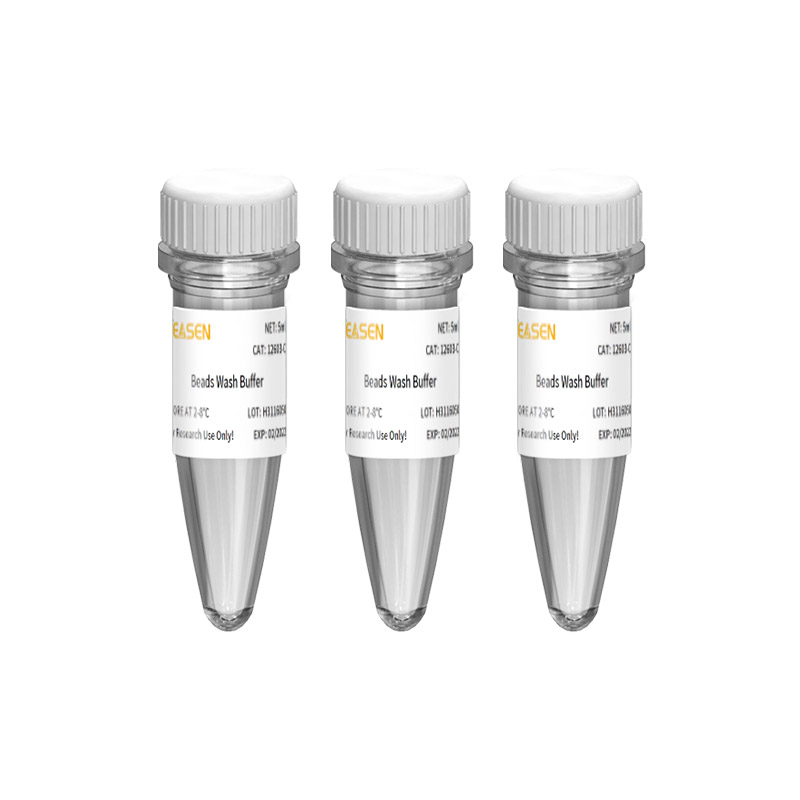Ultima Dual-mode mRNA Library Prep Kit for MGI®
Product Information
|
Product Name |
Cat# |
Specification |
|
Hieff NGSTM Ultima Dual-mode mRNA Library Prep Kit for MGI ® |
13330ES24 |
24 T |
|
13330ES96 |
96 T |
Product Description
Hieff NGS™ Ultima Dual-mode mRNA Library Prep Kit for MGI® is a new mRNA library construction kit specially developed and designed for MGI ® high-throughput sequencing platform. Compared with the traditional library construction method, this product combines cDNA two-strand synthesis with Endprep and dA-tailing, which greatly reduces the time for library construction and simplifies the operation process. The two types of buffers in the cDNA synthesis module can be used for constructing strand-specific or conventional library according to the needs. This product is compatible with 10 ng-4 μg of input total RNA from eukaryotic organism. After mRNA isolation, fragmentation, double-stranded cDNA synthesis, end repair, dA-tailing, adaptor ligation, and library amplification, the total RNA sample is finally converted into a library suitable for sequencing on the MGI® platform.
The kit contains two independent modules. The core of BOX-I is oligo (dT) magnetic beads required for mRNA purification. BOX-II contains mRNA fragmentation reagents, reverse transcription reagents, conventional and strand-specific ds-cDNA synthesis, and all reagents required for subsequent library construction. Among them, dTTP is replaced with dUTP in the strand-specific two-strand synthesis Buffer, so that dUTP is incorporated into the second strand of cDNA. Then, the high-fidelity DNA polymerase used in this kit cannot amplify the DNA template containing uracil, achieving strand specificity. All reagents provided have undergone strict quality control and functional verification, ensuring the stability and reproducibility of library construction to the greatest extent.
Shipping and Storage
All components in Box I are shipped with ice packs and can be stored at 2-8°C for one year.
All components in Box II are shipped with dry ice and can be stored at -20°C for one year.
Cautions
1 Operation
1.1 For your safety and health, please wear lab coats and disposable gloves for operation.
1.2 Thaw components at room temperature. Once the components are thawed, mix thoroughly by vortexing, spin the tube briefly and place on ice for later use.
1.3 It is recommended to perform each step reaction in a PCR machine with a heated lid. The PCR machine should be preheated to the set temperature before use.
1.4 Please use consumables that are free of RNase contamination and clean the experimental area regularly. It is recommended to use ThermoFisher's RNAZapTM high-efficiency nucleic acid removal spray to remove RNase contamination.
1.5 Improper operations may very likely cause carry-over contaminations through aerosols, impacting the experiment’s accuracy. It is highly recommended to divide the experiment environment into the pre-PCR and post-PCR regions, with separate sets of devices and disposables in each area. Perform routine cleaning for each area (It is recommended to use ThermoFisher's DNAZapTM high-efficiency nucleic acid removal spray).
1.6 For research use only!
2 Application
This kit is suitable for high-quality total RNA from eukaryotes such as animals, plants, and fungi with a starting input of 10 ng-4 μg (volume≤50 μL). If the initial RNA concentration is low and the volume exceeds 50 μL, it is recommended to condensed the DNA with Hieff NGSTM RNA Cleaner magnetic beads. To ensure that the mRNA has a complete poly(A) tail structure, RNA needs to be detected by the Agilent 2100 Bioanalyzer RNA 6000 Nano/Pico chip and the RIN value must be greater than 7.
The mRNA isolation module of this kit uses oligo (dT) magnetic beads. Only mRNA with poly(A) tail can be extracted; other RNAs without poly(A) tail, such as non-coding RNA, no poly(A) Tail mRNA etc. cannot be applied to this kit. In addition, this kit is not compatible with FFPE samples since the mRNA in the FFPE sample is severely degraded and usually does not have a complete poly(A) tail structure.
The library prepared by this kit can be used for a variety of RNA-Seq applications, including:
Ø Gene expression
Ø Single nucleotide variation discovery
Ø Gene fusion identification
Ø Splice variant analysis
3 Adapter Ligation
3.1 Currently, MGI only has two kinds of serial adapters:1-128 and 501-596. User Requirement Specification can be seen or known from MGI or Yeasen. In addition, MGI states: Due to the different design process of the two joints, it is forbidden to use them together, otherwise the sequencing data cannot be separated!
3.2 It is recommended to use high-quality commercial adapters. If self-made adapters are used, please entrust a company with experience in NGS primer synthesis and strict pollution control is required. In addition, it is recommended to prepare DNA annealing solution in a clean bench and only operate one type of adapter at a time to prevent cross-contamination.
3.3 The concentration of the adapter directly affects the ligation efficiency and library yield. In this kit, the volume of the adapter is fixed at 5 μL. Please dilute the adapter for the different amounts of input RNA according to Table 1. The adapters are recommended to be diluted with 0.1×TE buffer and the diluted adapters can be stored at 4°C for 48 hours.
Table 1 The recommended adapter amount for different amounts of input RNA
|
Input Total RNA |
Adapter stock concentration |
|
100-499 ng |
2 μM |
|
500-4000 ng |
5 μM |
* Adapter usage can be adjusted according to different types of Total RNA samples and inputs.
4 Bead-based DNA Clean up and Size Selection
4.1 There are multiple steps in the library construction process that require the use of DNA purification magnetic beads. We recommend using Hieff NGSTM DNA Selection Beads (Yeasen Cat#12601) or AMPureTM XP magnetic beads (Beckman Cat#A63880) for DNA purification and size-selection.
4.2 The magnetic beads should be equilibrated at room temperature before use, otherwise the yield will decrease and the sorting effect will be affected.
4.3 The magnetic beads should be mixed well by vortexing or pipetting before use.
4.4 Please be sure not to take the beads when transferring the supernatant, even trace amounts of the beads may impact the following reactions.
4.5 The 80% ethanol used for magnetic bead rinsing should be freshly prepared, otherwise it will affect the recovery efficiency.
4.6 The magnetic beads should be dried at room temperature before the product is eluted. Insufficient drying will easily cause residual ethanol to affect subsequent reactions; excessive drying will cause the magnetic beads to crack and reduce the purification yield. Normally, drying at room temperature for 3-5 minutes is enough to allow the beads to fully dry.
4.7 If needed, the purified or size-selected DNA samples eluted in 0.1×TE buffer can be stored at 4°C for 2 days or at -20°Cfor about a month.
5 Library Amplification
5.1 On the basis of the first-generation DNA polymerase, the high-fidelity DNA polymerase in the kit has greatly improved its amplification uniformity and exhibits no amplification bias.
5.2 Amplification cycle numbers should be strictly controlled. Insufficient amplification may lead to low library yield; Over-amplification may introduce increased bias, errors, duplicated read, and chimeric products. Table 2 lists the recommended cycle numbers for PCR amplification.
Table 2 The recommended Input Total RNA Amount and Number of Amplification Cycles*
|
Input Total RNA |
Number of cycles |
|
|
Non-stranded |
Stranded |
|
|
10 ng |
15 |
15 |
|
100 ng |
14 |
14 |
|
500 ng |
12 |
13 |
|
1 μg |
11 |
12 |
[Note]: *The yield of library is not only related to the input amount and the number of amplification cycles, but also affected by sample quality, fragmentation conditions and sorting conditions. In the process of library construction, consider the actual situation comprehensively and select the most appropriate library construction conditions.
Catalog No.:*
Name*
phone Number:*
Lot:*
Email*
Country:*
Company/Institute:*
Recommended products

